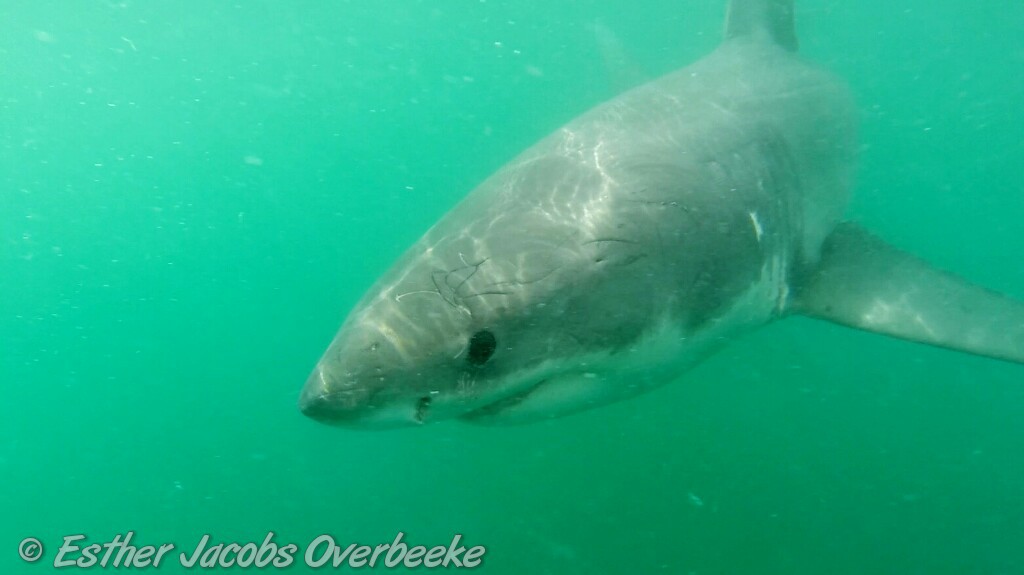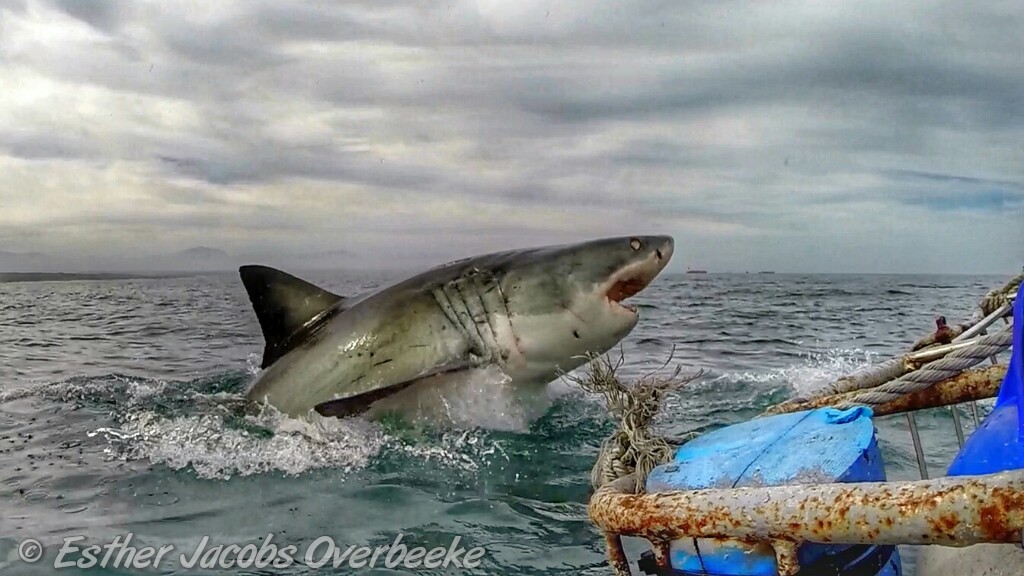Marine Life & Conservation
Sharks… we need them
Sharks have been dealt a poor hand. They are demonised by the media and film industry because that’s what sells papers and movies. It doesn’t help that most species aren’t particularly cute (case and point: the false catshark, Pseudotriakis microdon caught in Scottish waters in October 2015) so we can’t humanise them like we do with dolphins and other charming marine animals. However, sharks are absolutely vital for the health of our oceans, and in turn, the future of our planet.
Overfishing, finning, shark fishing tournaments, bycatch and longlining are all massively reducing our shark populations. Fishing practices like those encouraged by SSACN, pole and line fishing, should be the only methods used. Trawling is very destructive and unselective as the nets haul every life encountered. With longlining, boats spool out hundreds of feet of fishing line with up to 2,000 baited hooks spread along its length. With both these methods, a vast number of marine species, known as ‘bycatch’ are caught and thrown overboard dead or dying, including those listed as vulnerable, threatened or endangered. It was recently reported that thousands of spurdog are discarded into the sea dead annually in the UK. They get caught and crushed in the nets by trawlers pulling up massive catches from the depths. Bycatch amounts to up to 90% of a trawl’s haul and many of these are sharks due to their predatory nature. Global catches have increased by 300%, but much is unreported & unregulated so this figure is likely to be a lot higher. It would be great to see Scotland and the UK set an example with a drastic overhaul of fishing methods and quotas to ensure a sustainable future for UK seas.
Education among the angling community is also crucial and organisations like SSACN are not only valuable resources for information, but are proactive in encouraging best practices for sustainable fishing. With a recent report showing horrifying pictures of 40 dead cat sharks discarded on Chesil beach, by suspected anglers, angling conservation organisations need as much support as they can get to continue their positive messages to change these practices.
The most recent and accurate report states that up to 273 million sharks are killed each year. Sharks just cannot reproduce quickly enough to keep up with the demand and the only way to stop shark extinction is to stop the trades.
To envisage the vital role sharks play in our oceans, think about a fish tank and what needs to happen if one of the fish in that tank contracts a disease. You need to remove that fish from the tank before the disease spreads. Sharks prey on the diseased, the mutated, the injured and the weak, keeping the balance of our ocean’s ecosystem in check.
Sharks are at the top of the ocean food chain and their prey includes species that eat vegetation where the majority of the ocean’s carbon is stored, within seagrass, saltmarsh and mangrove. These blue carbon ecosystems, as they are called, capture and store carbon 40 times faster than rainforests and can store the carbon for thousands of years. Removing sharks from this ecosystem allows these vegetation eaters number’s to increase and results in a release of these ancient carbons and means that less carbon can be stored.
The oceans produce more oxygen than all the rainforests combined, provide a third of the world with food, remove half of the atmosphere’s greenhouse gases, and control our planet’s temperature and weather. Sharks and the oceans desperately need our help.
For individuals, other than ensuring best practice is used when fishing, there are easy ways to help save sharks:
- Never buy make-up or health goods containing shark liver oil, known as squalene
- Never buy products made of shagreen or shark leather
- Never buy fresh shark teeth or jaws
- Always ask what type of fish is being used for your fish and chips as restaurants / takeaways sometimes use shark a.k.a. rock salmon, rock eel, flake, huss or white fish
- Never eat shark fin soup or support a restaurant that sells it
As a Scot living in South Africa working in shark conservation, I have a lot of work to do to change public misconception and fishing practices used here. I recently started a campaign called Keep Fin Alive featuring Fin, a hand-puppet shark on a mission to be photographed with as many people as possible holding a sign that says “I hugged a shark and I liked it… Keep Fin Alive”. He’s already been photographed with well-known actors, singers, chefs, photographers and scientists, including John Hannah, Adam Handling and Jamie Scott. The ultimate goal of the campaign is to take a light-hearted approach to help change the common misconception of sharks and drive more attention to the issues facing sharks.
Esther Jacobs Overbeeke
Shark Conservationist
Founder: Keep Fin Alive
Marine Life & Conservation
Double Bubble for Basking Sharks

 The Shark Trust is excited to announce that, for two more days only, all donations, large or small, will be doubled in the Big Give Green Match Fund!
The Shark Trust is excited to announce that, for two more days only, all donations, large or small, will be doubled in the Big Give Green Match Fund!
Donate to Basking in Nature: Sighting Giants
The Shark Trust is hoping to raise £10k which will be doubled to £20k. This will go towards Basking in Nature: Sighting Giants. And they need YOUR help to reach they’re goal.
The Shark Trust’s citizen science project is to monitor and assess basking sharks through sightings; encouraging data collection, community engagement, and promoting nature accessibility. This initiative aims to enhance health and wellbeing by fostering a deeper connection with British Sharks.
Campaign Aims
- Increase citizen science reporting of Basking Sharks and other shark sightings to help inform shark and ray conservation.
- Provide educational talks about the diverse range of sharks and rays in British waters and accessible identification guides!
- Create engaging and fun information panels on how to ID the amazing sharks and rays we have on our doorstep! These can be used on coastal paths around the Southwest. With activities and information on how you can make a difference for sharks and rays!
- Promote mental wellbeing through increasing time in nature and discovering the wonders beneath the waves!
Donate, and double your impact. Click Here
Marine Life & Conservation
Leading UK-based shark conservation charity, the Shark Trust, is delighted to announce tour operator Diverse Travel as a Corporate Patron

 Corporate Patrons provide a valuable boost to the work of The Shark Trust. The Trust team works globally to safeguard the future of sharks, and their close cousins, the skates and rays, engaging with a global network of scientists, policymakers, conservation professionals, businesses and supporters to further shark conservation.
Corporate Patrons provide a valuable boost to the work of The Shark Trust. The Trust team works globally to safeguard the future of sharks, and their close cousins, the skates and rays, engaging with a global network of scientists, policymakers, conservation professionals, businesses and supporters to further shark conservation.
Specialist tour operator Diverse Travel has operated since 2014 and is committed to offering its guests high quality, sustainable scuba diving holidays worldwide. Working together with the Shark Trust will enable both organisations to widen engagement and encourage divers and snorkellers to actively get involved in shark conservation.
“Sharks are truly at the heart of every diver and at Diverse Travel, we absolutely share that passion. There is nothing like seeing a shark in the wild – it’s a moment that stays with you forever!” says Holly Bredin, Sales & Marketing Manager, Diverse Travel.
“We’re delighted to celebrate our 10th year of business by becoming a Corporate Patron of the Shark Trust. This is an exciting partnership for Diverse and our guests. We will be donating on behalf of every person who books a holiday with us to contribute towards their vital shark conservation initiatives around the world. We will also be working together with the Trust to inspire divers, snorkellers and other travellers to take an active role – at home and abroad – in citizen science projects and other activities.”
Paul Cox, CEO of The Shark Trust, said:
“It’s an exciting partnership and we’re thrilled to be working with Diverse Travel to enable more divers and travellers to get involved with sharks and shark conservation. Sharks face considerable conservation challenges but, through collaboration and collective action, we can secure a brighter future for sharks and their ocean home. This new partnership takes us one more valuable step towards that goal.”
For more information about the Shark Trust visit their website here.
For more about Diverse Travel click here.
-

 News3 months ago
News3 months agoHone your underwater photography skills with Alphamarine Photography at Red Sea Diving Safari in March
-

 News3 months ago
News3 months agoCapturing Critters in Lembeh Underwater Photography Workshop 2024: Event Roundup
-

 Marine Life & Conservation Blogs3 months ago
Marine Life & Conservation Blogs3 months agoCreature Feature: Swell Sharks
-

 Blogs2 months ago
Blogs2 months agoMurex Resorts: Passport to Paradise!
-

 Blogs2 months ago
Blogs2 months agoDiver Discovering Whale Skeletons Beneath Ice Judged World’s Best Underwater Photograph
-

 Gear Reviews2 weeks ago
Gear Reviews2 weeks agoGEAR REVIEW – Revolutionising Diving Comfort: The Sharkskin T2 Chillproof Suit
-

 Marine Life & Conservation2 months ago
Marine Life & Conservation2 months agoSave the Manatee Club launches brand new webcams at Silver Springs State Park, Florida
-

 Gear Reviews3 months ago
Gear Reviews3 months agoGear Review: Oceanic+ Dive Housing for iPhone








